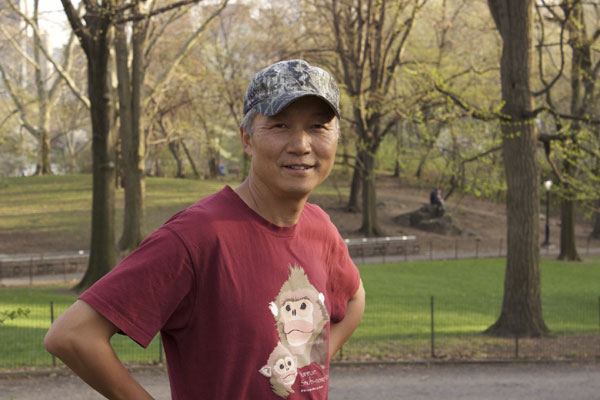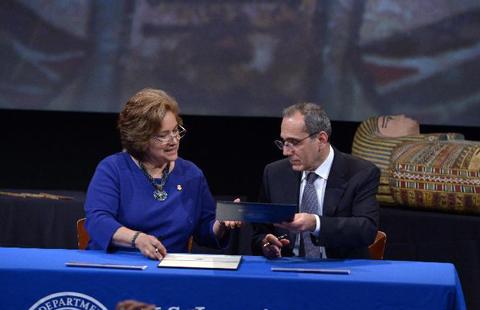Love of wildlife motivates films on rare monkeys
Updated: 2015-04-23 09:17
By XIAO LIXIN in New York(China Daily USA)
|
||||||||
 |
|
Xi Zhinong, China's leading wildlife photographer, has his latest documentary Mystery Monkeys of Shangri-La premiered on Wednesday at Asia Society in New York. Hong Xiao / For China Daily. |
Filmmaker Xi Zhinong's encounter with the snub-nosed monkeys of Yunnan two decades ago changed both his life and that of the rare animals.
Xi's latest film,Mystery Monkeys of Shangri-La,tells the story of the monkeys of White Horse Snow Mountain in Yunnan province.The documentary by Wild China Film and Mark Fletcher Productions Ltd premeired in New York on Wednesday at the Asia Society.
"I have never expected that what I did naturally out of my love for the monkeys, Tibetan antelope and other wild animals would have had such huge social influence," Xi said.
Twelve years have passed since his 2003 documentary,Mystery Yunnan Snub-nosed Monkey,to which he devoted 10 years of painstaking shooting on the mountain. That film won awards at the WildScreen Film Festival in England and the International Wildlife Film Festival in Japan.
Xi's regular visits to the mountain also made him aware of a threat to monkeys.In 1995, the local government planned to cut down the primeval forest near the mountain's south, which would have threatened the survival of more than 200 monkeys in the forest.
Xi,who had just finished threeyears of shooting, was shocked. He appealed to authorities with the photos he took of the monkeys, which eventually led to the deforestationbeing stopped and the saving of the habitat.
Xi's actions, which weredescribed by Newsweek as part of "China's budding green revolution", aroused unprecedented public attention and concern.
The rare, wild monkeys were discovered deep in the mountains of Yunnan provincein the 1960s. They have beguiling faces with small noses and large pink lips, and they are estimated to number about3,000.
Xi, 51, an internationally renowned wildlife photographer and founder of Wild China Film,first took close-up shotsof the species and presented them to the Chinese public in the early 1990s.
For the latest film,Xi returned and assembled an all-Chinese crew and spent the last three years documenting a family of the monkeys living in one of the highest forests in the world.
"The idea of shooting Mystery Monkeys of Shangri-La actually occurred on a trip when my team and I went to England for the WildPhotos 2012 and revisited the city of Bristol for that year's WildScreen Film Festival,where I was awarded for my last film work," Xi said.
"I was so surprised and shocked that during the 10 years, no Chinese wildlife photographer, me included, had done any film work to record the wild nature of our country," Xi frowned. "Back then, I, in fact, did have some plans and waited for a good timing."
After getting sponsored somehow accidentally, things seemed to get back on track. Thanks to advancing technologies thathelped cut costs, Xi's latest documentary adopted technological advances and followed the BBC standard.
"This time, a good partner and friend of mine, Mark (Fletcher),joined us, and his previous rich experience with the BBC has been a great help," Xi said.
Wildlife photography lags in China, and most of the well-known TV programs of this type in China, such as from Animal World and Discovery, are imported and dubbed or subtitled on air.
Xi estimated the number of professional Chinese wildlife photographers at no more than 10.
"Without the unconditional love and respect for wildlife and nature, it is impossible to make an outstanding wildlife photographer," an emotional Xi said.
Wild China Film, which Xi established in 2001, promotes environmental protection through photography and also trains young photographers.
The Chinese Wildlife Photography Training Camp, which his studio has run for many years, will open on April 28 in Gauri Gvong.
"What our camp strives to achieve is photographic techniques, and more importantly, to cultivate wildlife-loving eyes and heart," Xi said.
"I just hope that my work, be it photos or films, could make the public familiar and like the wildlife, then evoke the softest part of people and emotional resonance of life, and further invoke growing public awareness about the protection of wild animals and nature," Xi said. "People could only develop fondness of something after getting to know more about it. Otherwise, it would be mere empty talk."
The documentary also will air in the US on April 29 at 8 pm (ET) on PBS.
"We definitely present the most beautiful wild nature to the Chinese public and will try to air the episode via platforms of video websites, theaters and domestic TV stations (in China)," Xi said.
xiaolixin@chinadaily.com.cn
 Volcano erupts in southern Chile, belching ash, smoke into sky
Volcano erupts in southern Chile, belching ash, smoke into sky
 Across Canada (April 24)
Across Canada (April 24)
 Ten photos you don't wanna miss - April 23
Ten photos you don't wanna miss - April 23
 Concept cars in spotlight at Shanghai auto show
Concept cars in spotlight at Shanghai auto show
 US returns ancient artifacts to Egypt
US returns ancient artifacts to Egypt
 Unusual libraries around the world
Unusual libraries around the world
 Chinese real estate deals in US topical forum
Chinese real estate deals in US topical forum
 Weird stuff you can buy on Taobao
Weird stuff you can buy on Taobao
Most Viewed
Editor's Picks

|

|

|

|

|

|
Today's Top News
Sino-US nuclear cooperation proposal lauded
Furious 7 on track to be tops in China
As PayPal split looms, eBay plans to think small
China coal use to get cleaner
China sustains US cities: Bloomberg
Real estate investors may switch focus: panel
Obama submits nuclear energy cooperation deal with China
US urges Japan to handle wartime history in constructive way
US Weekly

|

|






